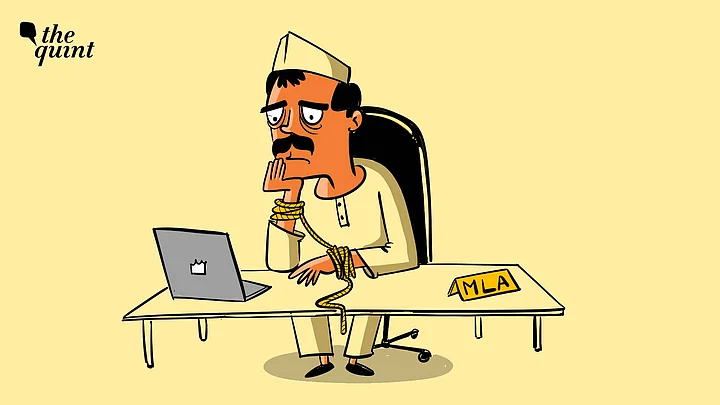(Help us do more in-depth stories by becoming a member)
In our democracy, the people’s expectations primarily rest upon their elected representatives. Whether for good or bad governance, citizens hold their representatives accountable. This public accountability is not merely criticism; it reflects the people’s sense of ownership and faith in their representatives — their hopes, frustrations, and aspirations are all directed toward them.
However, the reality is that legislators and Members of Parliament have neither defined statutory powers nor written rules governing their work outside the legislative chambers. For instance, if a legislator catches an officer red-handed in a case of corruption, the legislator has no direct authority to initiate legal or departmental action.
Similarly, if municipal councils in towns or panchayat departments in villages neglect essential public services such as sanitation, water supply, or development works, a legislator lacks the legal authority to act against such negligence. At best, the legislator may request the concerned minister to take appropriate action — but even that remains discretionary, not obligatory, as no formal framework exists for such interventions.
Challenges of Being Public Representatives
When the institutional framework of our legislative bodies — both at the state and national levels — was originally designed, it was perhaps assumed that legislators’ primary role was limited to lawmaking within the House. Consequently, no rules were framed regarding their responsibilities and powers beyond it. But in the present time, legislators’ roles outside the Assembly or Parliament have become far more demanding, often exceeding those of bureaucratic officers. A legislator today must remain accessible to the public round the clock, as people approach them directly for nearly every administrative or departmental grievance rather than approaching government offices.
Due to the absence of clear legal provisions, legislators cannot perform these external responsibilities with full effectiveness. Moreover, their involvement in executive functioning often lacks formal legal recognition, leading to frequent ambiguity — and at times, friction — between the legislature and the executive.
Therefore, it is imperative that uniform rules be framed across all states defining legislators’ powers and responsibilities outside the House. Such codified norms would enable legislators to discharge their duties toward the public in a more structured and transparent manner, while ensuring accountability and performance review mechanisms for the executive officers concerned.
Furthermore, the functioning of legislative assemblies within the House also requires greater procedural refinement in today’s context. Each legislator should have a structured mechanism to convey the views and interests of their constituency during the drafting of every new law. Similarly, every Member of Parliament must be empowered to represent their constituency’s opinion in the process of national lawmaking.
To take Punjab as an example, the Rules of Procedure and Conduct of Business in the Punjab Legislative Assembly, framed under Article 208(1) of the Constitution of India, govern only the internal working of the Assembly. Likewise, the Rules of Procedure and Conduct of Business in Lok Sabha, framed under Article 118, also pertain solely to parliamentary proceedings. Given the increasing public reliance on elected representatives for addressing routine administrative concerns, it has become necessary to frame Rules of External Conduct that define legislators’ engagement with executive authorities outside the House. The lack of such rules often results in institutional overlap and conflict between representatives and officials.
Selective Accountability
While the performance of legislators is reviewed by the public every five years through elections, there exists no direct mechanism for legislators to review the functioning of the executive. Despite legislators being accorded a protocol status equivalent to that of a Chief Secretary, this parity remains merely ceremonial and does not translate into operational authority.
It can thus be stated that the current democratic framework, as it stands, does not adequately support the evolving functional needs of legislators. The Constitution of India envisions three distinct organs — the Legislature, the Executive, and the Judiciary — each independent and non-interfering in the domain of the other. However, over the decades, the functional boundaries between the Legislature and the Executive have blurred in practice. Legislators are often compelled to intervene in administrative matters to address public demands, while officers frequently play a significant role in shaping legislative drafts.
Hence, the time has come to legally and transparently delineate these boundaries across the nation. Representatives should be empowered to interact with the executive within a defined constitutional and procedural framework — one that is both transparent and responsive to citizens’ legitimate expectations. Likewise, just as the electorate reviews the performance of its representatives every five years, there should also be periodic review mechanisms — through representatives — to assess the performance of the executive. This would ensure that capable and efficient officers receive due recognition and responsibility.
India’s Constitution is a masterpiece — comprehensive, visionary, and deeply rooted in the aspirations of its people. The best tribute we can pay to it is to keep evolving its application through timely, constitutionally guided rule-making, in line with the needs of a dynamic and participatory democracy.
(Dinesh Chadha is an advocate and MLA from Rupnagar, Punjab. This is an opinion piece. The views expressed above are the author’s own. The Quint neither endorses nor is responsible for them.)
